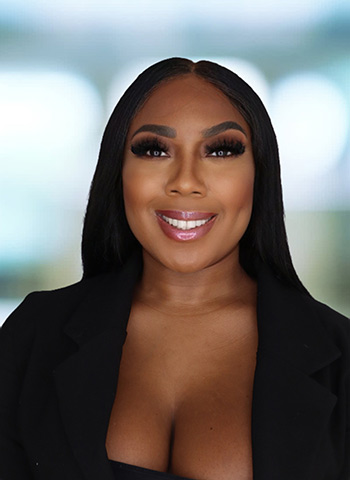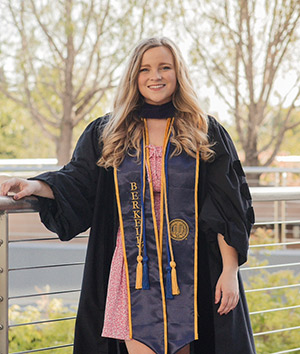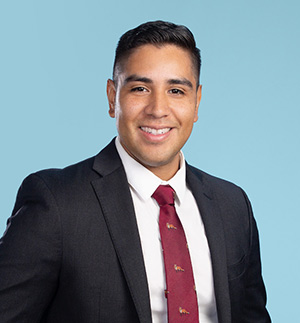By Andrew Cohen
As a public law school, meaningful access to a high-quality legal education is central to Berkeley Law’s core mission. With that comes a responsibility to promote access for students who are the first in their families to graduate from college and to pursue a professional degree.

The Berkeley Law Opportunity Scholarship (BLOS), a symbol of that commitment, has become a vital part of the school’s landscape. Alleyah Caesar ’24 is a prime example.
“My interest in attending Berkeley Law was sparked by its prestige, strong reputation in social justice, and commitment to making the legal field racially inclusive,” she says. “As a first-generation student, the BLOS scholarship was crucial in making this opportunity accessible and ensuring that financial constraints didn’t hinder my pursuit of education.”
Providing guaranteed non-loan funding to cover tuition and fees for three years of study, the scholarship is largely fueled by donors. Robert Evans ’71 and his wife Norma Evans and Cara Sandberg ’12 recently made multi-year pledges to the program.
“I have the pleasure of serving as a mentor to a number of BLOS scholars and they are exceptional,” says Berkeley Law Alumni Association President Cara Sandberg ’12. “I believe this scholarship is a critical avenue for Berkeley Law to recruit exceptional students to our law school community. It is a joy to support the academic and professional success of our BLOS scholars as both a mentor to students and a donor to the scholarship.”
Recipients also secure a spot in the Pre-Orientation Program before the start of classes to ease the transition into law school, and many participate in the student-run First Generation Professionals organization.
There have been 58 BLOS recipients at Berkeley Law, 31 of whom are enrolled this year. The program started in 2015 with annual cohorts of three to five students, and expanded to 10 per year in 2021. A committee of staff members, students, and alums conduct in-person and virtual interviews to select the group.
“We strive to honor the legacy of Berkeley Law’s commitment to diversity, and more broadly to our absolute belief in the transformative power of education and our commitment to making education affordable,” says Alice Young, director of admissions for outreach and recruitment. “The BLOS program’s growth and strength is a testament to that commitment.”
A promising path
Former Co-president of the school’s Black Law Students Association chapter, Caesar worked in New York City the past two summers at Perkins Coie and Simpson Thacher & Bartlett, exploring litigation work focused on white collar crime, antitrust, and insurance matters.
She graduated summa cum laude from Spelman College, where she worked extensively with inmates, juveniles, and families of incarcerated loved ones through various organizations. Caesar chaired the youth subcommittee of the governor-appointed Georgia Department of Juvenile Justice State Advisory Group, creating an engagement program to improve community relations between law enforcement and minority youth.
“My work with helping incarcerated persons has deepened my understanding of the issues surrounding mass incarceration,” says Caesar, who has continued that work with Berkeley Law’s Post-Conviction Advocacy Project. “This experience has fueled my passion to address systemic inequalities, work towards reform, and create a more just legal system.”
Noting that people who are the first in their families to earn a college degree bring an important perspective to the law school, Young relishes seeing BLOS recipients go on to spearhead student journals, pro bono programs, student organizations, and fill other leadership positions — and seeing them surge into the legal profession after graduating.
“They are judicial clerks, public defenders, public interest fellows, and associates at some of the top law firms across the country,” Young says. “Not only are they the first in their families to graduate from college and law school, but they’re leaders, advocates, and innovators. As a first-generation college graduate, it brings me enormous pride to lead the BLOS program and to celebrate these successes.”
Caesar says the scholarship’s ability to support her personal journey while aligning with Berkeley Law’s public mission makes it doubly rewarding.

“It enhances diversity, encourages students from various backgrounds to contribute their perspectives, and fosters a more inclusive community,” she says. “I know this is the right place for me. I’ve worked hard, and this scholarship helps me stand out in a field where people like me are often neglected.”
Turning their dreams into reality
Maddy Pilgrim ’22 wanted to attend Berkeley Law because of its commitment to supporting public interest and public service careers. Now a deputy public defender in Contra Costa County, she credits the BLOS program for making her career aspiration possible.
“The day I stepped foot on campus for Admitted Students Weekend, I felt deeply supported in my endeavors,” Pilgrim says. “As a first-generation college student, I didn’t have any familial support in navigating the higher education system. With the community and financial support of BLOS, I was able to focus on learning during law school. I could finally spend time on studies and complete hundreds of hours of pro bono work, without also having to manage multiple jobs.”
Pilgrim notes that the program not only brings in an important sector of students, but empowers them in both the classroom and the legal field.
“The BLOS community is made up of a subset of students that are so often underrepresented in the post-graduate educational space — including us — enriches the school’s overall learning environment,” she says.

Jose Lua Valencia ’18, now a litigation associate at Pillsbury in San Francisco, was inspired to become a lawyer after seeing his family’s life change for the better because of zealous legal advocacy. While eager to do the same for other people, he knew little about navigating law school and the road to the legal profession.
“I knew at Berkeley I would be taught by a first-rate faculty, surrounded by passionate law students, in one of the most beautiful regions of the U.S.,” he says. “BLOS was critical at helping me bear the financial burden with confidence and demystifying my path.”
Even before starting classes, after being selected as a BLOS recipient Valencia recalls multiple opportunities to meet and start developing mentoring relationships with members of the law school administration and professors teaching 1L classes.
“It certainly helped the school feel more like home those first few weeks,” he says. “And throughout my three years at Berkeley Law, the school and BLOS community continued to foster that community and mentoring by organizing get-togethers with our professors and the BLOS funders, who themselves are accomplished lawyers.”